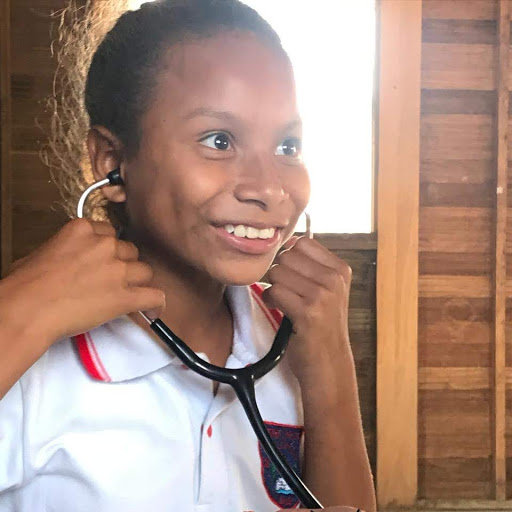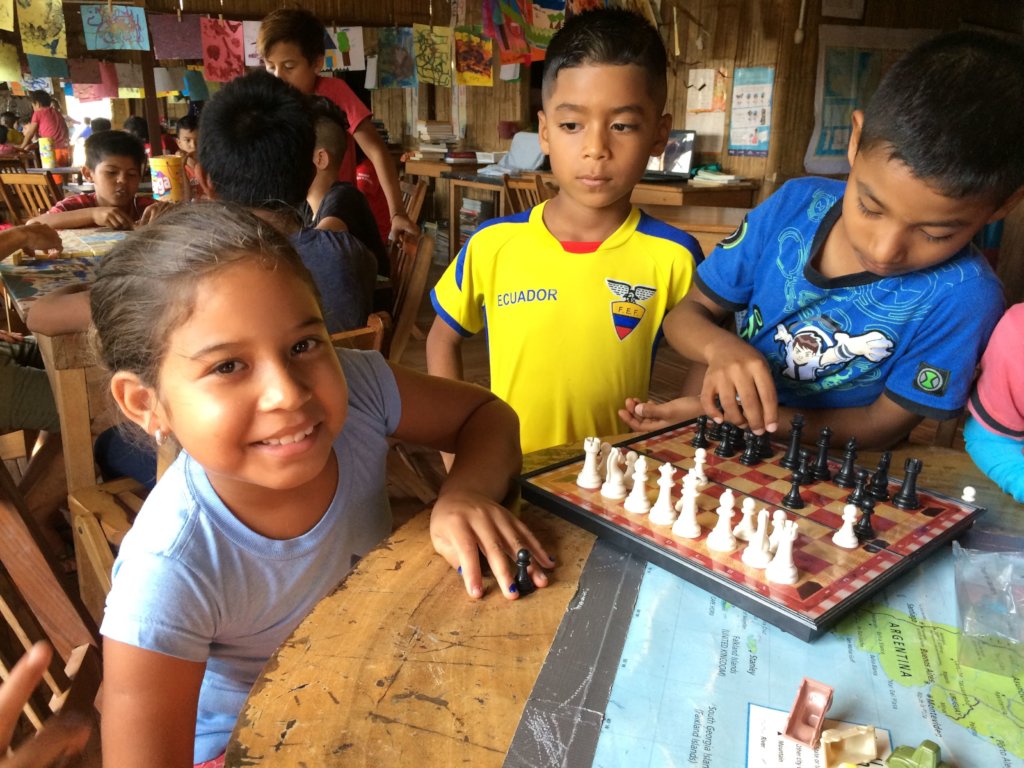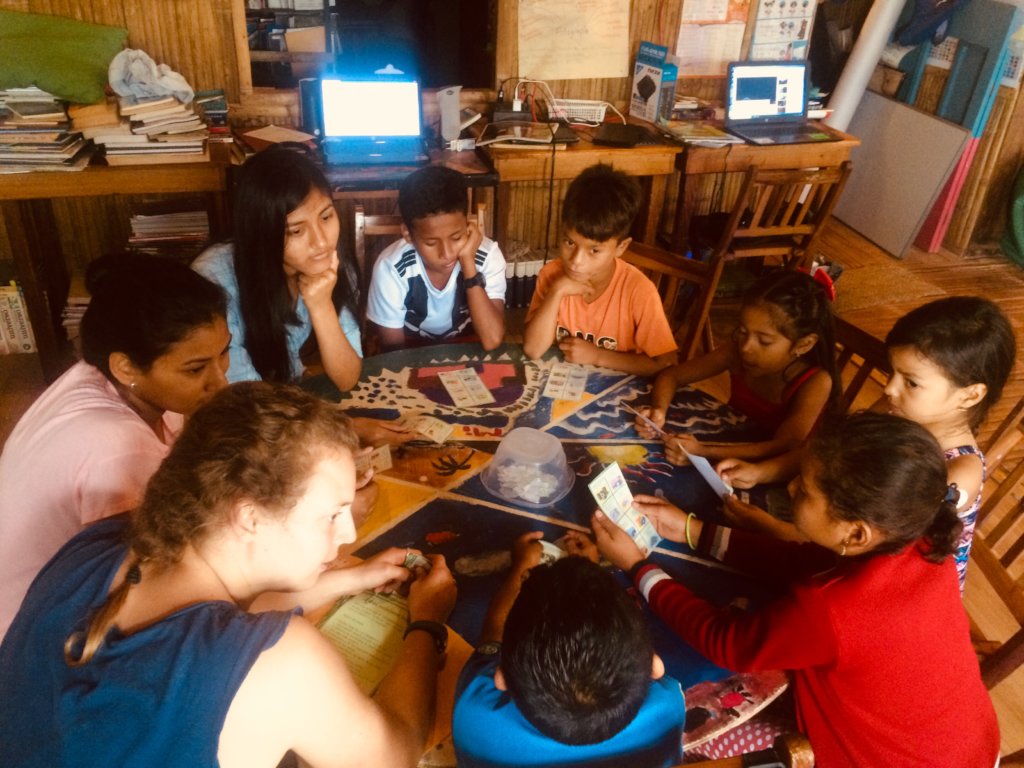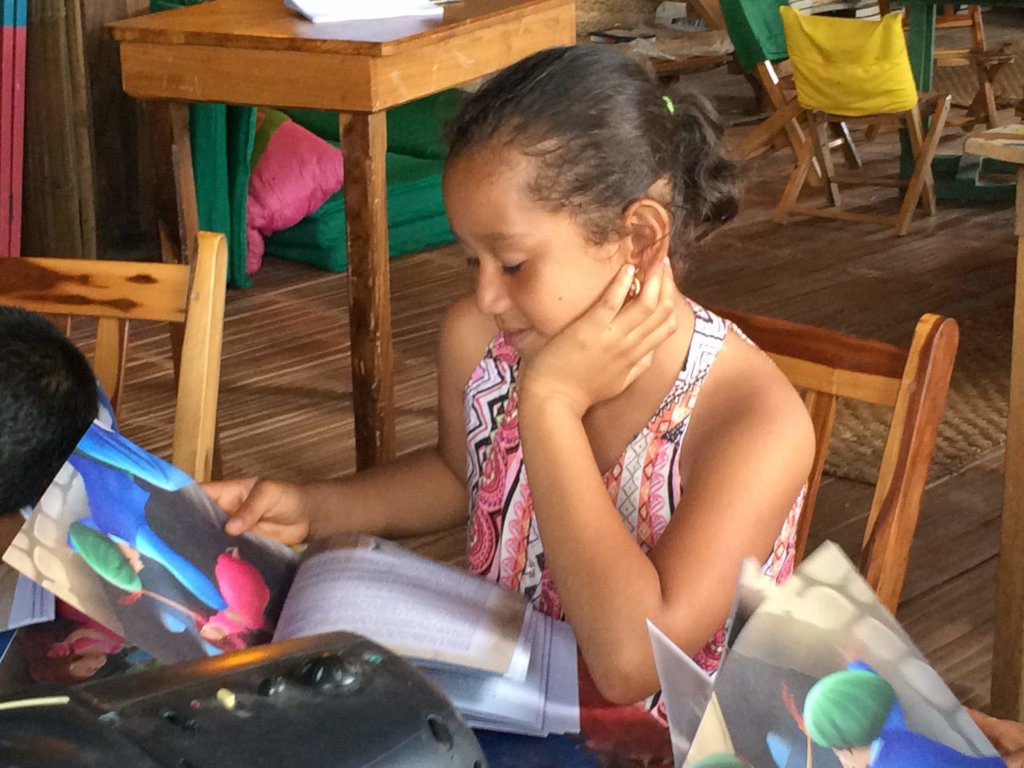By Rut Roman | Project Leader
Every day our work in the Library is rewarding. It starts when we approach the local school and see the children’s faces light up at the sight of the Library bus that will take some of them to remedial reading sessions. It’s rewarding when we reach the Library and are greeted by the international volunteers that live there and have arranged everything so as to receive the children. Each volunteer has something to tell us about their weekend or the day before: how they discovered a new fruit or met a new neighbor. Some are on a long term world trip and spend a couple of months of their trip with us; others, like Myriam and Danny, have come all the way from their home in Murcia, Spain just so they can participate in this project. This is their first visit to South America and after serving as volunteers, they will head back home. We are always happy to see their gradual transformation. They arrive with urban mores and limits, dependent on strict schedules and structured time. In a few weeks, they start to loosen their ties and constraints and start to feel more at ease about the way time is enjoyed in a tiny fishing village. Danny, an account by trade, is enjoying his first experience in the tropics, and his first experience working with children. “I truly appreciate this opportunity to be involved in an effort to help these children overcome the barriers of illiteracy in such a challenging context; this makes every day meaningful”. Danny is beaming with happiness, and we all can see how significant his presence is for the children. His calm and warm demeanor has a soothing effect on the children.
Once the day is over we all take a few minutes to talk about the events of the day. We exchange anecdotes about this or that child who shows slight progress. Myriam tells us how L (age 9) had a breakthrough, for the first time he acknowledged his frustration and anger. L’s father is constantly coming in and out of prison due to domestic violence and other bullying habits. After reading, coloring and talking about the “emotionary,” a beautifully colored book that addresses children’s emotions and passions, L was relieved when leaving the Library. This is how we are trying to nurture new masculinities.
We are thrilled to see adult women come to the Library, this is something that has started to occur with the soccer training sessions on Mondays and Fridays. Some women were not able to come, not because they were not interested, but because many of their husbands would not allow them to be away from house chores. When they showed interest in attending night school, which we were able to start through an Agreement with the Ministry of Education, again, their husbands did not see fit that they should be away, especially during dinner time or any other meal to be served.
With the soccer training for boys and girls, and especially with the boys training, many moms come because they carry the water for their boys. While girls bring their own water, change their shoes; some boys require their mom’s assistance. Ironically this is the only way N (age 26) is starting to learn how to write her own name and give her first steps towards literacy. N was born into a large family, she was the first child among 15 siblings; so much of her childhood was spent in rearing her younger siblings. In her family, only the boys went to school, N was married off at 15 with an older man and now, she must attend to her own family’s needs. She could not register for night class or come to the Library, but with the young boys soccer training, she is now coming twice a week. It is exciting to see her childish delight about every step she conquers towards reading and writing.
With our current volunteers we continue to empower girls and now are addressing new masculinities. Myriam, our wonderful Spanish volunteer is a professional Learning Counselor and has set up an “Emotional corner” where we are tending to young boys and helping them draw, write and express emotions that are culturally forbidden for boys. This void makes young boys disconnect with their feelings. Myriam has come up with the idea of decorating a corner of the Library with these “emotional monsters”: figures of the monster of anger, or the monster of fear, jealousy, tenderness, sadness, grief, or happiness. Boys, as soon as they register are invited to come and write or paint on how they are feeling when they come to the Library, and if they feel like it, register how they feel, when they leave. All these small events are part of our great rewards.
These rather simple, but ambitious steps are what make our days. Just recently we were invited to a soccer match a few miles down the road to Tabuga, a small fishing village north of Don Juan. We took almost 30 of our kids to this event, and were happily surprised at the difference in the interactions among the different groups. While the other kids were very violent with each other -especially boys- and verbally abusive, the children from Don Juan just looked at this behavior as one they don't feel compelled to do anymore.
So, yes, this Library is changing lives, starting with our own lives that are now so much more meaningful and filled with different kinds of content. Children are doing much better in school and have a sense of ownership with the Library, after all, it’s theirs. They come in with a sense of pride and, after doing their homework, reading in Spanish or English with one of our lovely and caring volunteers, they leave at their ease.
Maybe this is why this project is being replicated in a number of small Libraries in neighboring villages. Estero Seco, El Cruce, Tasaste, and La Division have asked our help in providing them with books, resources, experience, and training. We are now scheduling our weekly visits to see how we may continue to support, advise or celebrate their achievements. Our purpose is that each small Library be its own model. We are not imposing anything, we are sharing an experience.
A library is a welcoming place where a child finds a librarian that knows how to invite her to read and explore interests she may not be aware of, a place where she’s always greeted with love and respect.
And this rewarding project is possible only because of your generous support. Please do continue to help us sustain this life-changing Library.
Links:
Project reports on GlobalGiving are posted directly to globalgiving.org by Project Leaders as they are completed, generally every 3-4 months. To protect the integrity of these documents, GlobalGiving does not alter them; therefore you may find some language or formatting issues.
If you donate to this project or have donated to this project, you can receive an email when this project posts a report. You can also subscribe for reports without donating.




